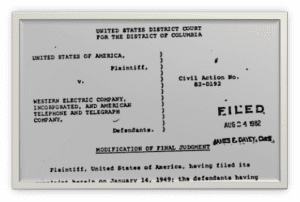Telstar and the Bell System's Forgotten Anniversary
If you watched Wimbledon's epic showdown live on television, then you have Telstar to thank. Launched 50 years ago, the Telstar-1 satellite, brainchild of Bell Labs, made international live broadcasts possible. On July 10, 1962, the age of global communications truly began.
July 10, 2012

By Camille Mendler
If you watched Wimbledon’s epic showdown live on television, then you have Telstar to thank.
Launched 50 years ago, the Telstar-1 satellite, brainchild of Bell Labs, made international live broadcasts possible. On July 10, 1962, the age of global communications truly began.
Telstar was a very big deal for AT&T and the U.S. government. Countering Soviet space superiority was not the only reason. Space was AT&T’s newest money-making pursuit.
But mere weeks after Telstar’s launch, John F. Kennedy’s Communications Satellite Act prevented AT&T’s Bell System monopoly from extending into space.
It was a sure sign of things to come. In 1982, the U.S. Department of Justice finally secured victory: agreement to break up the Bell System – that vast arsenal of vertically-integrated assets which once controlled 90% of the U.S. telecom industry.*
The forgotten anniversary
 Unlike Telstar, there will be no anniversary celebrations for what’s known as the Modification of Final Judgment. Yet it was a landmark in anti-trust history that – 30 years later – is still relevant today.
Unlike Telstar, there will be no anniversary celebrations for what’s known as the Modification of Final Judgment. Yet it was a landmark in anti-trust history that – 30 years later – is still relevant today.
In 2012, anti-trust scrutiny is focusing on Apple, Facebook, Google and Microsoft.
Regulators are asking if these companies’ digital services distort markets. For some, the focus is also on their collection and use of personal data – a critical issue when our opinions and preferences are their profit engine.
Regulators’ unenviable task is to determine when market dominance becomes abuse and to whose detriment. But can regulators keep up in a digital economy where new hegemonies can appear overnight?
The skull beneath the skin
If you care to peel back the skin, several non-telcos driving the digital economy now share a surprisingly similar bone structure with the Bell System. Facebook is venturing into submarine cable ownership; Google already has. Physical telecom assets are increasingly cool and necessary.
Not least, Google’s involvement in the O3b satellite system – due to launch in 2013 – has the potential to be as defining as Telstar. O3b aims to serve the 3 billion people in emerging markets currently without broadband connectivity.
That’s a powerful capability for a company that could now subsidize a first world smartphone for the rising third world.
Who’s the incumbent now?
What’s curious is that inheritors of several Bell System assets – Alcatel-Lucent (owner of Bell Labs) and Ericsson (owner of Bellcore/Telcordia) – now seem prouder of their telecom heritage than the telcos themselves.
Perhaps it was luck, but when I last met Alcatel-Lucent’s Ben Verwaayen, his assistant Christine ushered me into his office wearing an iconic red telephone box dress.
Verwaayen is deeply concerned that basic telecom infrastructure should continue to be built – particularly in Europe – but with costs and access fairly apportioned across its beneficiaries.
Meanwhile, although Ericsson’s Hans Vestberg took convincing that his 137-year-old company shares a familial lineage with Google and the Bell System, he told me he’d certainly like Google’s valuation.
What’s more, with access to 900 million telco subscribers through Ericsson’smanaged services deals, I reckon he’s got the wherewithal to give the likes of Google a bloody nose in some areas.
The next 50 years
So where does this leave the telcos? Saying mea culpa for past misdeeds won’t pay next month’s rent.
As their competitors and partners architect vertically-integrated business models, telcos like AT&T, Deutsche Telekom, Orange, Singtel and Telefónica are pursuing a profoundly outward urge to capture digital innovation.
Exactly what they’ll celebrate in the future remains unknown, but they won’t simply rely on past glories.
For further analysis of these issues, my presentation: The New Incumbents: Anti-Trust in the Digital Economy is freely downloadable from Slideshare.
*The actual breakup came in 1984.
Read more about:
DiscussionYou May Also Like



.png?width=300&auto=webp&quality=80&disable=upscale)




.png?width=300&auto=webp&quality=80&disable=upscale)


_1.jpg?width=300&auto=webp&quality=80&disable=upscale)